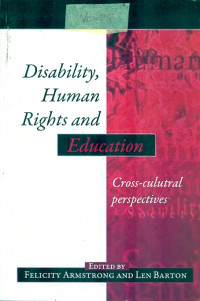
Text
Disability, human rights and education
The right to liberty is crucial since it builds a bridge between the person's forum internum (protection of the internal capacity for self-direction) and the forum externum (preservation of external space for action or behaviour predicated on freely chosen goals). It is no accident that the very highest level of due process protection is reserved in most legal systems for loss of the right to liberty. More generally, access to a court in order to vindicate rights is an important safeguard in any society. It enables disputes between persons to be resolved peacefully and it enables a disinterested party (the courts) to establish the boundaries between competing rights. The right to association enables the individual to construct his/her own legal universe freely with others. Although it is applicable mostly in the economic sphere (e.g., the right to join trade unions or employers' associations), it also has critically important applications in the political sphere (right to form or join a political party) and in the social sphere (right to associate with others on intimate terms). The family might to some extent be perceived as an example of the exercise of freedom of association although it also naturally serves other autonomous and important social and moral ends. The right to equality serves to control the quality of State action or legislation inasmuch as it presupposes that burdens or benefits should not be invidiously distributed in society. This formal or juridical interpretation of equality is familiar throughout the world but there are other possible interpretations, most importantly the concept of equality of opportunity which requires the State to play an active role in ensuring genuinely equal opportunities for all regardless of difference. It should thus allocate and apply its resources, for example in the educational sphere, in such a way as to ensure equal opportunities for all. But it also means that the State has a role to play in regulating the behaviour of private actors when it has or tends to have a negative impact on equality of opportunity. It generally does so through non-discrimination legislation, which is also applicable to the private sector. In the case of disability, such legislation normally requires the would-be discriminator to take positive account of the disability and to "reasonably accommodate" the person concerned.
Availability
| KP.IV.5.00003 | KP.IV.5 ARM d | My Library | Available |
Detail Information
- Series Title
-
-
- Call Number
-
KP.IV.5 ARM d
- Publisher
- Inggris : Open university press., 1999
- Collation
-
xiii, 230 hlm. ; 21 cm.
- Language
-
English
- ISBN/ISSN
-
0-335-20458-9
- Classification
-
KP.IV.5
- Content Type
-
-
- Media Type
-
-
- Carrier Type
-
-
- Edition
-
-
- Subject(s)
- Specific Detail Info
-
-
- Statement of Responsibility
-
-
Other version/related
No other version available
File Attachment
Comments
You must be logged in to post a comment
 Computer Science, Information & General Works
Computer Science, Information & General Works  Philosophy & Psychology
Philosophy & Psychology  Religion
Religion  Social Sciences
Social Sciences  Language
Language  Pure Science
Pure Science  Applied Sciences
Applied Sciences  Art & Recreation
Art & Recreation  Literature
Literature  History & Geography
History & Geography